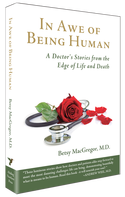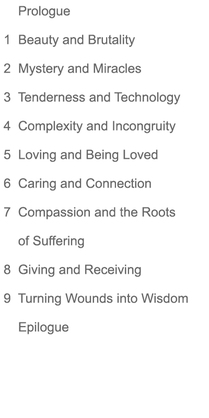Latwan - Chapter 8: Giving and ReceivingLatwan had to carry a heavier load than most people do, and all his life he had shouldered that load without complaint. He had sickle-cell disease, and like my patient Keith, he suffered recurring painful sickle-cell crises that claimed him when his misshapen red blood cells would suddenly start to clump together, forming tiny clots that clogged his capillaries and caused excruciating pain that lasted for days, sometimes weeks. But unlike Keith, Latwan had not become a psychological cripple from the repeated battering his body took. Although he had endured more than fifty hospitalizations by the time he was a teenager, he remained a sweet-tempered, cheerful boy.
Many of us on the pediatric staff knew Latwan well and felt moved by his courage. We lamented whenever we saw him returning, curled up on a stretcher in pain, his face drawn and his eyes closed tight as he tried to ride out the storm. We knew that even our strongest painkillers could only blunt the pain, not banish it. Then, sooner or later, we would cheer when the storm would pass and he would find his feet again and depart for home, seemingly undaunted by the knowledge that the pain would return again, and yet again.
Latwan lived with his mother in a tiny apartment on the Lower East Side, in a neighborhood burdened with drugs, violence, and poverty. The two of them found refuge from the hardship of life at a church a block from their home, where the congregation had built a strong sense of community. Latwan and his mother were close, and though she could not afford to lose her job cleaning offices in a downtown business building, she stayed at his side as much as she could whenever he was admitted to the hospital. She would bring his homework to him and sit patiently in a chair beside his bed, reading to him and transcribing his answers to assignments. Unlike many other kids we cared for with sickle-cell disease who fell far behind in school due to their frequent absences, Latwan was determined to keep up, no matter what, and with his mother’s help he somehow managed.
Over the years, I saw Latwan grow from a gangly preadolescent into a poised youth approaching manhood, so good-looking I thought for sure he must have a gaggle of girls at his heels all the time. But when I inquired, as doctors do, if he had a girlfriend, he smiled shyly and indicated he had not had time for that particular pleasantry yet. Between all his school activities and the youth group he attended at church, he had too many other things on his mind. As his senior year in high school began, Latwan confided that his greatest goal was to graduate and be accepted to college, preferably somewhere outside the city so that he could broaden his horizons. He did not know where he would get the money, but he thought it would work out somehow. The real problem, he said, was that he was not certain his mother would be happy with his leaving. He worried about her. He knew how difficult her life had been because of him and how hard she had always worked to help him, and he did not know if she could bear to let him go. It was something he would have to work on, I remember him concluding with a smile. The last time I saw Latwan, when he came back to the hospital in crisis again, shortly before he was due to graduate, he told me with a grin that broke right through his pain, that he had achieved his goal and been accepted to his first choice of college. Not only that, he said, but he had done so well in school that he had been awarded a scholarship—an unheard-of thing in his community—which would make it possible for him to go. “And the best thing,” Latwan said with the glint of satisfaction in his eyes, “is that it’s alright with my mom. She told me that she’ll definitely miss me, but that’s only natural, and I shouldn’t worry about her. She said she’ll be able to get along just fine without me, and it’s okay for me to go.” He paused for a moment of thoughtful silence, and then added, “I’m really proud of her.” And in spite of the sickle-cell crisis raging in his bloodstream, he looked oddly at peace, as if he were, for the moment at least, beyond the reach of worry as well as bodily pain. Two weeks later, shortly after his graduation ceremony, Latwan died in his sleep, at home, from a stroke. It was one of the lethal blows that sickle-cell disease can sometimes deliver. His mother found him in the morning in his bed, and she cried her heart out before she finally called the hospital to let us know. When I heard, the news stopped me in my tracks and tears coursed down my cheeks. Other members of our staff reacted similarly as I passed the news on. Later in the day, when the initial shock of the news had passed and its reality had sunk in, thoughts of Latwan moved through my mind as I went about my work on the ward. Latwan had known better than any of us, I realized, how uncertain the future was and how suddenly disaster could strike. He would not have been surprised, I thought, that such a thing as sudden death could happen to him. He might even have sensed, on some level, that this was coming. In fact, maybe part of his great determination to put in place his plan to live away from home had come from his desire to be able to give his mother a final gift in case he was suddenly taken away: the gift of preparing her, as best he could, for his leaving, whether temporary or permanent. After all, she was the person who would be hit the hardest by his absence. It would not be surprising, it seemed to me, if this were true. It would be a very natural thing to want to do. Several days later, I went to Latwan’s funeral together with our pediatric nurse, Marcie, who had attended to Latwan during many of his stays on the ward. We stood against the back wall of the little community church, as all the seats were taken. From there we could just make out, on the top of the altar, a framed photograph of Latwan smiling broadly in his graduation cap and gown. The minister, a stately man with silvered hair and a flowing black robe, spoke with a resonant voice that filled the hall. He was very saddened, he said, to be conducting a service for the untimely loss of yet another young man from their community. Far too many of their youth died young, he said, almost always because of violence. He was grateful that this was not true for Latwan, and he celebrated Latwan for not allowing such a thing to happen to him. Yet he regretted deeply, as they all did, that Latwan was no longer with them, but had been called home by the Lord. When the minister finished his comments, various parishioners stood up, one after another, and gave testimony to how they had known Latwan. Clearly, a great many had been touched by him in one way or another, and both Marcie and I were comforted to know how much he had been loved. Hearing about Latwan as he had been known by the people in his community—people who had watched him grow from a toddler into a young man—I gained a larger, richer picture of the person he had been. I also saw there was a side of Latwan that these people who loved and admired him did not know, a side that I, as his doctor, did. So finally, as the service was about to conclude, I raised my hand and asked permission to speak. When the minister nodded, everyone in the church turned their attention to the back of the room where Marcie and I were standing. Addressing the congregation in my loudest voice, I told them that the Latwan I knew was a person of great courage. I told them that he had lived from birth with a condition that could flare up at any moment and set his body on fire with burning pain—a heartless condition that would leap on him with sharp teeth and claws and pull him down into agony that could last for days and days, no matter how hard we doctors and nurses tried to help. I told them he had fought more battles with that illness than I could count and had won every one of them. He had steadfastly refused to be defeated. He would not let hardship take his dreams away from him, and he never wasted a moment feeling sorry for himself. I said all who knew him at the hospital had been inspired by his bravery and determination. When I finished, there was complete silence. For one terrible moment, I wondered if my speaking had been intrusive or if I might have offended Latwan’s community with what I said. But then a voice shouted “Hallelujah!” and quickly one voice after another followed with the same exclamation. As every person in the church rose enthusiastically to their feet to join in the uplifting outcry, I breathed a sigh of relief. Soon everyone was milling around, wiping tears from their cheeks and embracing each other. I went to Latwan’s mother, and we gave each other a long, heartfelt hug. Then several people asked to shake my hand and express their gratitude for having deepened their knowledge of Latwan. They had always felt that he was someone special, they said. He had given them hope in life. And they found it good to hear how others saw him. It showed them they were right to hold on to such hope. Eventually, the minister called the gathering back together for his closing remarks. In a deep voice containing both sorrow and profound patience, he declared that Latwan’s life had been a gift to their community. This young man who so many knew and admired had shown it was possible to follow one’s dreams and taste their fulfillment, despite the toughest of life’s obstacles. Even his death, as sad as it might be, was a gift, the minister proclaimed, because in his dying Latwan had shot up into the heavens and burst open like a glorious Fourth of July firecracker, raining down sparks of goodness on all those he loved. And though he was gone from the world now, he had left a little bit of the hope-filled light from his life in the heart of every person who had known him. I could not have agreed more. |
Excerpt Table of Contents
|

